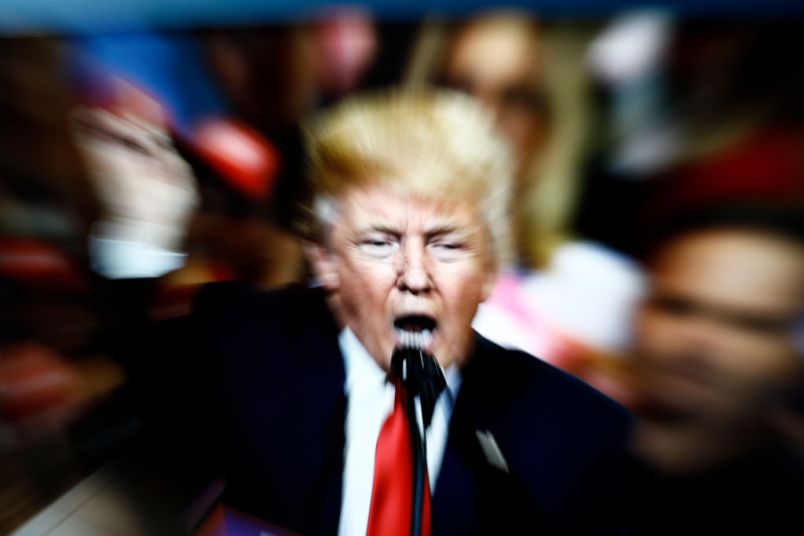One great theme of reportage on the Trump presidency is that it took Trump almost his entire term of office to learn how to make the federal government run to his purposes, to bend it to his will. He learned to ignore his cabinet secretaries and operate through the lesser-known officials with their hands on the levers of power. He found ways to exploit the maze of loopholes, workarounds and unenforceable laws which essentially allowed him to ignore Senate confirmation and oversight. This week Axios published a big report on how Trump and his top advisors are planning to use this knowledge in a second term to gut the federal bureaucracy and restock it with an army of Trump loyalists. In other words, in term one, Trump’s very ignorance and laziness provided a critical insulation against his worst instincts and most malicious goals. In term two he will hit the ground running knowing exactly what to do.
While accurate in many regards, this view of the man and the trajectory of his presidency misses the essence of it. What hides from most, almost in plain sight, is that Trump now rarely discusses any political agenda — even in the broadest, most guttural and least policy-oriented sense of the term. There is no agenda other than revenge and payback for the injustices and injuries he personally suffered in his first term: the Democrats, the RINOs, Mueller, the impeachments, the “fake news”, what he memorably calls “Russia, Russia, Russia,” “Big Tech.” Remember that “fake news” wasn’t part of Trump’s 2016 campaign argot. That was appropriated from the growing discourse of campaign misinformation he profited from and retrofitted for use against what he perceived as an unfriendly press. Grievance and payback have always been the central touchstones of Trumpism. But this is distinct. To appreciate his arc we have to go back to the beginnings of the Trump presidency.
When Trump won the presidency he seemed to view it as a prize that would make him the guy in charge and that every one would love him. Who doesn’t kiss up to the guy in charge? He staffed his administration not with ideologues or loyalists so much as the kind of people whose respect and admiration he’d always craved: retired generals, CEOs of public companies, financiers, celebrities. He was quickly disabused of these fantasies as his nascent presidency was engulfed in a wave of protests and investigations even before he was sworn in. Trump’s whole presidency, in terms of staffing and so much more, can be viewed as an arc from 1) disappointed expectations of a fawning and loving public to 2) hiring people to protect him from various threats and controversies of his own making to 3) finally staffing with an eye toward punishing all the people he now defined as enemies. In a real sense Trump’s entire presidency was consumed with first defense against and then psychodrama about the Russia investigation.
To the extent it could be summarized in conventional policy terms, Trump’s 2016 campaign promised a crackdown on immigration from countries outside of Europe (symbolized by “The Wall”) and a campaign to make America respected again (not have them “laughing at us”) in the world. In Trump’s argot, winning.
I basically defy you to think of the last time Trump has mentioned either one of those things or anything else he campaigned on back in 2016. His policy agenda in office, to the extent it existed, came into being by patching together the wishlists of various individuals and political faction who promised to defend him. Today his entire political program centers around vindication and retribution over the “stolen election” and vengeance against various groups and individuals, in and out of government, who he either didn’t know existed or didn’t know he had any beef with when he came down that escalator seven odd years ago.
We should be legitimately terrified by Trump’s current plans to gut the federal civil service if he returns to the White House. But it’s also worth asking why he even cares. Yes, there’s some making common cause with people who have specific ideological and regulatory axes to grind. There’s an element of self-protection, weeding out people who might in his mind resist or betray him. But in most cases this is at best indirect. The real driver simply seems to be revenge against the people and the governmental-regulatory blob he sees as having hurt him during his first four years in office. To put it slightly differently, the entirety of the second term seems to be payback for hurt feelings and disappointment over things that happened in the first.
Of course, this transition was possible and perhaps inevitable because Trump’s politics were always about grievance and retribution. This was and is the bond he shares with all his followers. But in the original incarnation they weren’t so tightly connected to his personal grievances, his own personal and often very idiosyncratic and risible hurts. That is one of many reasons I suspect that Trump himself will never be president again. I’m not saying I’m sure or that I don’t regard it as a big and consuming threat. But if we look at the slow deterioration of his support over the last year we see a process not driven mostly by revulsion at his behavior, disagreement with his politics or his failed coup to stay in power. It’s the relentlessly backward looking nature of his current politics. You hear it again and again. He’s got to move on. How much time do people have to keep litigating the last election when his successor himself will soon be half way through his first term? The fatigue is deepened by the fact that virtually all of Trump’s supporters know he simply lost.


 Members-Only Article
Members-Only Article
